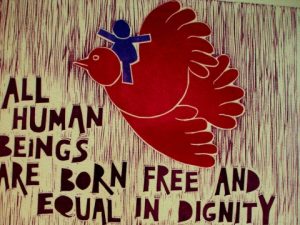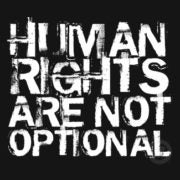
People from all walks of life who believe in human rights and social justice woke up with great fear on November 9. For the U.S. President-elect had, during a bitter campaign, expressed grave disrespect towards large segments of our society, and views and promises deeply at odds with equal human dignity.
What are we to do now? Here are eight ideas, beginning with the political, moving to ways to support social justice where government policy may denigrate it, and concluding with the more personal.
Demand justice
1. Become part of a social justice movement. Social justice movements are alive and as insistent in their demands for justice as ever. They’re already planning to how respond to new political realities. Choose the issues that most stir your passions for justice. Is it the rights of immigrants? Nuclear disarmament? Criminal justice reform? Climate change? Health care? Workers’ rights? Women’s rights? Global development? Refugees? There are movements around all these areas, and more. Find them. Support them. Join them.
Participate in marches, rallies, calls to action. Help to create new political space in the months ahead, and prepare the ground for candidates committed to the rights of all in the next elections. As President Obama has so often has reminded us, the arc of history is long, but it bends towards justice. We need to keep it that way.
2. Engage politically. Demand policies that advance justice and vigorously oppose those that are unjust – even where, in the near term, justice seems certain to be on the losing side. Register your dissent. Do not let the deportation of our neighbors or exclusion of refugees and immigrants or offenses to our climate happen in the face of your silence.
But do not allow anger to cause you to miss opportunities. In many areas, huge questions remain. For all the promises and votes to repeal the Affordable Care Act, some of the law will likely remain, as the President-elect himself has now said. How far it can or will be undone and what changes Congress implements remain open questions. It may be possible to mitigate the damage. And in some areas, progress may be possible. The President-elect has spoken to the need to bring jobs and opportunity to those who have been left behind.
So there will be political space that will affect how the United States engages people’s rights. Occupy that space with your demands for justice. Write, call, tweet, meet your congresspeople and members of the new administration. And remind them that America is at our greatest when we live true to our ideals of human rights, of liberty and justice for all, at home and around the world.
Be strategic in your advocacy. In some areas, such as clean energy and reducing the prison population, economic and security arguments might have an impact even when direct appeals to science, justice, and human rights might not. Do not underestimate the power of the human face of rights realized – and denied. And don’t forget the states, for in areas from carbon reduction policies to minimum wage increases, some states have been at the policy forefront.

If our government steps back, step forward
3. Contribute to organizations working for human rights, social justice, and our shared humanity. Contributions might be financial. If the U.S. government turns its back on refugees, consider a contribution to organizations that help refugees, such as the International Rescue Committee. Support organizations working to advance social justice and human rights in the United States and around the world, particularly ones whose mission assumes extra importance where campaign promises threaten to become U.S. policy, such as those organizing around immigrants’ rights, justice for communities of color, and a nuclear weapons-free world.
You could also contribute your time. Volunteer. If the government steps away from programs to provide nutrition, housing, health care, legal support, and economic opportunity, community organizations may have to step up. You can step up with them.
[UPDATE 11/23/16: Nicholas Kristof has a number of excellent specific suggestions, including ways to fight Islamophobia and to support groups like the Southern Poverty Law Center.]
4. Work for justice. Spend for justice. Where government abrogates its human rights responsibilities, initiatives taken outside government can help fill the gap. If your job involves working for justice and human rights, keep it up! Otherwise, maybe you can infuse justice into your work – taking on asylum or other human rights-related cases if you are an attorney, for example, or encouraging your company to invest in the communities in which it does business and to adopt greener policies.
If Congress and the new administration weaken environmental protections and undermine workers’ rights, we will need consumer power to fill in for regulatory power. By making an extra effort to buy from companies that are committed to the rights of their workers – up and down the supply chain – and a clean environment, we can bring companies’ economic calculus in line with responsible actions.
Love, hope, and justice: Ever onward
5. Share your inspirations. In times of fear and uncertainty, it is too easy to wallow in despair. That will get us nowhere. More than ever, those who believe in human rights must double down in striving to achieve them for all people. Songs of solidarity and justice were a core part of the civil rights movement of the 1960s. They inspired, they bonded, they made friends of strangers. Songs remind us that above our elected leaders are the people – that this land is our land. They force us to ask the big questions. And they assert our common humanity and need to respect our beautiful diversity.
6. Let shine your kindness and compassion. As Eleanor Roosevelt reminded us, human rights begin “In small places, close to home – so close and so small that they cannot be seen on any map of the world.” Be extra kind to members of the American family and of the global family whom the President-elect told during campaign, in so many words, that they are less than welcome, less than fully valued. Send the opposite message. Reach “out to someone who looks or worships differently than” you do. And hold the President-elect to account to his post-election pledge of unity.
7. Don’t give up hope. As long as we have hope in a better tomorrow, we can continue to work for that better tomorrow. Many people, including myself, never imagined this election result. Yet sometimes, it is the strength of the winds of justice that surprises us. Who would have thought a dozen years ago the right of gays to marry would be the law of the land throughout the United States? Not possible. Too ambitious. Yet it happened. Such changes do not always happen. But with enough work, they can.
Vice President Biden likes to quote this verse from the Irish poet Seamus Heaney:
History says don’t hope
On this side of the grave.
But then, once in a lifetime
The longed for tidal wave
Of justice can rise up
And hope and history rhyme.
If, instead of rhyming, we hear a discordant sound, it is for us to return the rhyme, to prove that love and hope and peace are mightier than hate and despair and violence, to make that “once in a lifetime” every day of our own lifetimes.
8. Love<. “Love trumps hate.” It must ever be so. Even if we do all we can in the political sphere to bring about justice in our communities, country, and world, our ability to create political change, at least in the near term, will have its limits. But nothing can diminish our ability to create change in another way: to give life to our common bond as human beings through love. This deepest of human emotions and our work for human rights themselves share a bond. For in a world filled with love for all, we will inevitably respect the dignity of all, and so insist upon realizing the rights of all. In all spheres of your life, then, love. Add to the quotient of love in the world, and you will help keep the arc of history bending towards justice.
******
Last week’s election has brought much anxiety to many in our nation. Within the realm of health, fear stretches from the future of the Affordable Care Act to U.S. policies abroad. The O’Neill Institute for National and Global Health Law has been at the center of national health discussion for the past ten years. As experts in our field, we seek to contribute to discussions on how the election will affect health policy at home and beyond. Over the next week-and-a-half, we will issue a series of blog posts on the likely effects of the next U.S. administration on health. We hope that these postings will help outline the challenges before us, and perhaps even some possible ways forward.



